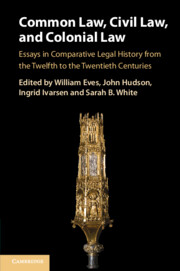Andrew J. Cecchinato
University of St Andrews
Justine Collins
Max Planck Institute for European Legal History
William Eves
University of St Andrews
Carsten Fischer
University of Trier
Clara Günzl
University of Münster
John Hudson
University of St Andrews
Ingrid Ivarsen
Emmanuel College, Cambridge
Tanya Josev
University of Melbourne
Ciara Kennefick
Christ Church, Oxford
Łukasz Korporowicz
University of Lodz
Annamaria Monti
Bocconi University
Attilio Stella
University of St Andrews
Alice Taylor
King’s College London
Sarah B. White
University of St Andrews
David V. Williams
University of Auckland
Ian Williams
University College London
 Common Law, Civil Law, and Colonial Law
Common Law, Civil Law, and Colonial Law Book contents
- Common Law, Civil Law, and Colonial Law
- Common Law, Civil Law, and Colonial Law
- Copyright page
- Contents
- Contributors
- Acknowledgments
- Introduction: Situating, Researching, and Writing Comparative Legal History
- 1 ‘In aliquibus locis est consuetudo’: French Lawyers and the Lombard Customs of Fiefs in the Mid-Thirteenth Century
- 2 What Does Regiam maiestatem Actually Say (and What Does it Mean)?
- 3 James VI and I, rex et iudex: One King as Judge in Two Kingdoms
- 4 George Harris and the Comparative Legal Background of the First English Translation of Justinian’s Institutes
- 5 The Nature of Custom: Legal Science and Comparative Legal History in Blackstone’s Commentaries
- 6 Through a Glass Darkly: English Common Law Seen through the Lens of the Göttingische Gelehrte Anzeigen (Eighteenth Century)
- 7 Looking Afresh at the French Roots of Continuous Easements in English Law
- 8 Case Law in Germany: The Significance of Seuffert’s Archiv
- 9 Leone Levi (1821–1888) and the History of Comparative Commercial Law
- 10 Radical Title of the Crown and Aboriginal Title: North America 1763, New South Wales 1788, and New Zealand 1840
- 11 The High Court of Australia at Mid-Century: Concealed Frustrations, Private Advocacy, and the Break with English Law
- 12 English Societal Laws as the Origins of the Comprehensive Slave Laws of the British West Indies
- Index
Contributors
Published online by Cambridge University Press: 01 April 2021
- Common Law, Civil Law, and Colonial Law
- Common Law, Civil Law, and Colonial Law
- Copyright page
- Contents
- Contributors
- Acknowledgments
- Introduction: Situating, Researching, and Writing Comparative Legal History
- 1 ‘In aliquibus locis est consuetudo’: French Lawyers and the Lombard Customs of Fiefs in the Mid-Thirteenth Century
- 2 What Does Regiam maiestatem Actually Say (and What Does it Mean)?
- 3 James VI and I, rex et iudex: One King as Judge in Two Kingdoms
- 4 George Harris and the Comparative Legal Background of the First English Translation of Justinian’s Institutes
- 5 The Nature of Custom: Legal Science and Comparative Legal History in Blackstone’s Commentaries
- 6 Through a Glass Darkly: English Common Law Seen through the Lens of the Göttingische Gelehrte Anzeigen (Eighteenth Century)
- 7 Looking Afresh at the French Roots of Continuous Easements in English Law
- 8 Case Law in Germany: The Significance of Seuffert’s Archiv
- 9 Leone Levi (1821–1888) and the History of Comparative Commercial Law
- 10 Radical Title of the Crown and Aboriginal Title: North America 1763, New South Wales 1788, and New Zealand 1840
- 11 The High Court of Australia at Mid-Century: Concealed Frustrations, Private Advocacy, and the Break with English Law
- 12 English Societal Laws as the Origins of the Comprehensive Slave Laws of the British West Indies
- Index
Summary
- Type
- Chapter
- Information
- Common Law, Civil Law, and Colonial LawEssays in Comparative Legal History from the Twelfth to the Twentieth Centuries, pp. vii - viiiPublisher: Cambridge University PressPrint publication year: 2021
- Creative Commons
- This content is Open Access and distributed under the terms of the Creative Commons Attribution licence CC-BY-NC-ND 4.0 https://creativecommons.org/cclicenses/
